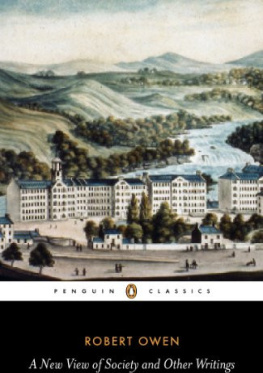Claeys Gregory - A New View of Society and Other Writings
Here you can read online Claeys Gregory - A New View of Society and Other Writings full text of the book (entire story) in english for free. Download pdf and epub, get meaning, cover and reviews about this ebook. City: London;England;New York;N.Y;USA;Great Britain, year: 1991;2009, publisher: Penguin Group USA, Inc., genre: Politics. Description of the work, (preface) as well as reviews are available. Best literature library LitArk.com created for fans of good reading and offers a wide selection of genres:
Romance novel
Science fiction
Adventure
Detective
Science
History
Home and family
Prose
Art
Politics
Computer
Non-fiction
Religion
Business
Children
Humor
Choose a favorite category and find really read worthwhile books. Enjoy immersion in the world of imagination, feel the emotions of the characters or learn something new for yourself, make an fascinating discovery.
- Book:A New View of Society and Other Writings
- Author:
- Publisher:Penguin Group USA, Inc.
- Genre:
- Year:1991;2009
- City:London;England;New York;N.Y;USA;Great Britain
- Rating:3 / 5
- Favourites:Add to favourites
- Your mark:
- 60
- 1
- 2
- 3
- 4
- 5
A New View of Society and Other Writings: summary, description and annotation
We offer to read an annotation, description, summary or preface (depends on what the author of the book "A New View of Society and Other Writings" wrote himself). If you haven't found the necessary information about the book — write in the comments, we will try to find it.
No Description Available
A New View of Society and Other Writings — read online for free the complete book (whole text) full work
Below is the text of the book, divided by pages. System saving the place of the last page read, allows you to conveniently read the book "A New View of Society and Other Writings" online for free, without having to search again every time where you left off. Put a bookmark, and you can go to the page where you finished reading at any time.
Font size:
Interval:
Bookmark:
PENGUIN  CLASSICS
CLASSICS
A NEW VIEW OF SOCIETY AND OTHER WRITINGS
ROBERT OWEN (17711858) was born in Newtown, Wales, the son of a saddler and ironmonger. Apprenticed as a draper's shop assistant, he rose by the age of thirty to become among the most important cotton-spinners in Britain and a pioneer in schemes for humane factory management, the eight-hour workday and the education of the poor. But during the economic crisis which followed the ending of the Napoleonic Wars, Owen became convinced that the new system of steam-powered manufacturing would either ruin the country or, if properly guided, would provide plenty and leisure for all. Connecting his theories about education without punishment to the new economic developments, Owen by 1820 demanded the rehousing of the unemployed working classes in experimental co-operative villages engaged in both agriculture and manufacturing, and sharing their produce in common. Opposition by the clergy, political economists, and his fellow manufacturers helped convince him that the entire old society based upon competition and individualism was rotten, and that if a society composed only of a few rich and many poor was to be avoided, a new moral world would have to be constructed where all lived in such communities. He purchased a site at New Harmony, Indiana, and later another in Hampshire, but was unable to maintain a community for longer than a few years. For a time he was also a trade union leader and during the 1840s had many thousands of followers. Today he remains respected as a pioneer socialist, feminist, freethinker and advocate of an ecological approach to industry and urban life.
GREGORY CLAEYS is Professor of History at Royal Holloway, University of London. Amongst other works, he is the author of two studies of Owenism, and editor of Owenite Socialism: Pamphlets and Correspondence (10 vols, Routledge, 2005).
ROBERT OWEN
and other writings
Edited with an Introduction by GREGORY CLAEYS
PENGUIN BOOKS
PENGUIN CLASSICS
Published by the Penguin Group
Penguin Books Ltd, 80 Strand, London WC2R 0RL , England
Penguin Group (USA) Inc., 375 Hudson Street, New York, New York 10014, USA
Penguin Group (Canada), 90 Eglinton Avenue East, Suite 700, Toronto, Ontario, Canada M4P 2Y3 (a division of Pearson Penguin Canada Inc.)
Penguin Ireland, 25 St Stephen's Green, Dublin 2, Ireland (a division of Penguin Books Ltd)
Penguin Group (Australia), 250 Camberwell Road, Camberwell, Victoria 3124, Australia (a division of Pearson Australia Group Pty Ltd)
Penguin Books India Pvt Ltd, 11 Community Centre, Panchsheel Park, New Delhi 110 017, India
Penguin Group (NZ), 67 Apollo Drive, Rosedale, North Shore 0632, New Zealand (a division of Pearson New Zealand Ltd)
Penguin Books (South Africa) (Pty) Ltd, 24 Sturdee Avenue, Rosebank, Johannesburg 2196, South Africa
Penguin Books Ltd, Registered Offices: 80 Strand, London WC2R 0RL , England
www.penguin.com
First published in Penguin Classics 1991
Introduction copyright Gregory Claeys, 1991
All rights reserved
The moral right of the editor has been asserted
Except in the United States of America, this book is sold subject to the condition that it shall not, by way of trade or otherwise, be lent, re-sold, hired out, or otherwise circulated without the publisher's prior consent in any form of binding or cover other than that in which it is published and without a similar condition including this condition being imposed on the subsequent purchaser
ISBN: 9781101493762
He is an extraordinary man a wonderful man such a one indeed as the world has never before seen. His wisdom, his comprehensive mind, his practical knowledge, but above all, his openness, candor, and sincerity, have no parallel in ancient or modern history.
Robert Owen was born in Newtown, Wales, on 14 May 1771, the son of a saddler and ironmonger who was also the local postmaster. As a child, Owen already possessed a determined and forceful personality: later his blithe dismissal of criticism would infuriate even close followers. He loved nature but read literature, history, travel, and biography voraciously, and by the age of seven was assistant to the local schoolmaster. Though religiously inclined, he later recalled, Owen at ten concluded that all existing theologies were erroneous.for his great industriousness, he moved to a similar, better-paid post in London four or five years later, and then another in Manchester. Soon he had learned three things which were to prove crucial to his subsequent career: the art of turning a profit, a sense of the debasing nature of selling and its frequent reliance upon dissimulation, and a feel for cloth.
At the age of seventeen Owen thus found himself in Manchester, which was then just becoming the leading centre of cotton-manufacturing in Britain. Most spinning and weaving still took place at home. But forms of production were quickly being altered by technical developments, notably the invention of Samuel Crompton's mule for producing fine yarn and the introduction of the steam-engine in place of water power at the end of the eighteenth century. Owen soon saw the implications of these changes, and not only in terms of the rapid expansion of production, but equally the increase in urban overcrowding, the rising rate of disease and premature death, and the intensification of work and discipline in the new factories.
Arriving in 1788, Owen remained twelve years in Manchester. The progress of his career was meteoric. By 1790, at the age of nineteen, he had acquired from loans, his savings, and a fortuitous partnership three spinning-machines worked by three labourers. When the position of manager of the first large cotton-spinning mill fell open, however, Owen offered his services. Soon superintending 500 men and women, he was enormously successful, vastly increasing the quality of the cotton spun, and quickly becoming the owner's partner.notoriously liberal views on marriage, little is known of their subsequent relationship, though Owen was very tolerant of his wife's more orthodox religious opinions.)
When Owen arrived at New Lanark he already believed that the new factories provided an ideal venue for behavioural experimentation, and that the vices of the labouring classes, increasingly assailed by evangelicals in particular, could be eliminated through correct training, thorough supervision, and management on principles of justice and kindness. Within a decade, New Lanark was renowned throughout Europe both for its approach to labour and for the quality of its cotton thread, which brought Owen and his partners a highly lucrative trade. The factory workforce itself comprised some 2,000 people, including about 500 pauper children apprenticed from local workhouses. When Owen commenced, he complained that the workers were frequently drunken, prone to theft, and dishonest. Within a dozen years, he later boasted, they were models of industry, sobriety, and orderliness, thanks to his New Views, as they came to be called, of education and management.
How did Owen accomplish this considerable feat? His approach at New Lanark was not socialist. Not only was the word not used until the late 1820s, but Owen had no conception of profit-sharing at the mills, and no dream of eliminating competition, which he would later describe as the chief cause of unemployment and much other social distress. Instead he sought to eradicate vice without punishment and without wielding religious threats, by offering a healthy education and a reasonable working and living environment for his labourers. The latter were not easily convinced of his good intentions. But gradually, through Owen's persistent kindness it was the quality which all who ever met him most frequently recalled and especially after being paid full wages in 1806 when an American embargo on cotton exports halted production, they were won over. Nevertheless, Owen not only enjoyed extremely high profit margins, but still employed children from the age often (he wished to raise this to twelve). Most of his labourers also worked the usual load of fourteen hours daily until 1816, when hours were reduced to twelve. Owen himself sought to reduce these further to ten per day, but was frustrated, as he often was at New Lanark, by his partners' wish solely to buy cheap and sell dear. Exasperated in turn by Owen's experimental whims, the partners tried to force him out. But Owen found new investors and acquired the mills on better terms to himself. Upon his return to New Lanark, the townspeople astounded his new partners by unhitching his horses and joyfully pulling his carriage through the village.
Font size:
Interval:
Bookmark:
Similar books «A New View of Society and Other Writings»
Look at similar books to A New View of Society and Other Writings. We have selected literature similar in name and meaning in the hope of providing readers with more options to find new, interesting, not yet read works.
Discussion, reviews of the book A New View of Society and Other Writings and just readers' own opinions. Leave your comments, write what you think about the work, its meaning or the main characters. Specify what exactly you liked and what you didn't like, and why you think so.











